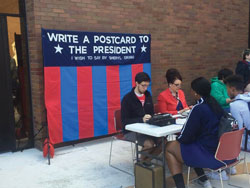The University has transitioned away from virtual learning for the fall semester, with 75 percent of undergraduate courses and 68 percent of graduate courses being taught in person. For many, this has raised concerns over the safety of returning to campus due to the ongoing pandemic. Provost and Senior Vice President for Academic Affairs Pamela Scott-Johnson addressed some of these uncertainties.
“The University continues to follow guidance from the Centers for Disease Control and Prevention and Office of Secretary of Higher Education as well as guidelines established by health officials from the State of New Jersey and the Monmouth County Regional Health Commission,” said Scott-Johnson.
“With the health and safety of all of the Monmouth University community at the forefront, and consistent with our commitment to return to campus, we put in place masking and 3-ft social and physical distancing in the classroom spaces when possible, and have continued COVID-19 cleaning protocols across campus, and availability of disinfectant wipes and hand sanitizer.”
Increased vaccination rates and required testing for those who chose not to take the vaccine have also aided in reducing safety concerns. “We have asked all to provide their vaccination status or request for exemption, with most of the campus choosing to be vaccinated. Individuals who are not fully vaccinated are subject to weekly testing,” Scott-Johnson explained.
The University’s Crisis Management Team was established prior to the COVID-19 outbreak, but it has played an integral role in planning and executing a return to normalcy on campus and was expanded to give more attention to pandemic-specific demands. “The Crisis Management Team worked closely to plan our return to campus, continues to meet semi-weekly to monitor all of the information we are receiving, and responds to issues as soon as they arise,” said Scott-Johnson.
Class modalities have returned to being mostly in-person, with 75 percent of undergraduate and 68 percent of graduate courses being taught in-person in a limited, socially-distant classroom setting. “The University has capped all courses at 25 students. Classrooms were measured to accommodate 3-feet social distancing between students’ seats, and with recommendations that classroom seating not be altered,” explained Scott-Johnson. “Room capacities were determined based on modified recommendations from the CDC and state health officials, in discussions with the University’s Crisis Management Team.”
The University has been overwhelmingly cautious with the precautions it has implemented as more students begin to return to campus. Scott-Johnson explained that, “We chose to put these protocols in place out of our commitment to maintaining the high-quality education that Monmouth University students expect.”


